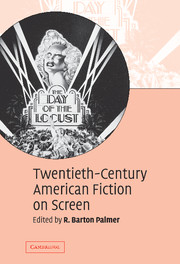Book contents
- Frontmatter
- Contents
- List of illustrations
- Notes on contributors
- Acknowledgments
- Introduction
- 1 Filming an unfinished novel: The Last Tycoon
- 2 The texts behind The Killers
- 3 The Day of the Locust: 1939 and 1975
- 4 Ship of Fools: from novel to film
- 5 Intruder in the Dust and the southern community
- 6 Dramatizing The Member of the Wedding
- 7 Film and narration: two versions of Lolita
- 8 World War II through the lens of Vietnam: adapting Slaughterhouse-Five to film
- 9 John Huston's Wise Blood
- 10 Genre and authorship in David Cronenberg's Naked Lunch
- 11 Screening Raymond Carver: Robert Altman's Short Cuts
- 12 The Color Purple: translating the African-American novel for Hollywood
- 13 The specter of history: filming memory in Beloved
- 14 Filming the spiritual landscape of James Jones's The Thin Red Line
- Filmography
- Index
- References
8 - World War II through the lens of Vietnam: adapting Slaughterhouse-Five to film
Published online by Cambridge University Press: 12 January 2010
- Frontmatter
- Contents
- List of illustrations
- Notes on contributors
- Acknowledgments
- Introduction
- 1 Filming an unfinished novel: The Last Tycoon
- 2 The texts behind The Killers
- 3 The Day of the Locust: 1939 and 1975
- 4 Ship of Fools: from novel to film
- 5 Intruder in the Dust and the southern community
- 6 Dramatizing The Member of the Wedding
- 7 Film and narration: two versions of Lolita
- 8 World War II through the lens of Vietnam: adapting Slaughterhouse-Five to film
- 9 John Huston's Wise Blood
- 10 Genre and authorship in David Cronenberg's Naked Lunch
- 11 Screening Raymond Carver: Robert Altman's Short Cuts
- 12 The Color Purple: translating the African-American novel for Hollywood
- 13 The specter of history: filming memory in Beloved
- 14 Filming the spiritual landscape of James Jones's The Thin Red Line
- Filmography
- Index
- References
Summary
By 1972, the year the film adaptation of his 1969 novel Slaughterhouse-Five premiered, Kurt Vonnegut (b. 1922) was well on his way to becoming one of the most famous writers in the world. After more than two decades of hard work as a short story writer and novelist, he had expanded his notoriety far beyond his limited core audience of science fiction fans and college hipsters and was connecting with millions of readers, especially with those disillusioned over the ongoing war in Vietnam. Although Slaughterhouse-Five was a fictionalized account of Vonnegut's experiences in World War II, the book's audience also read it as a critique of America's long and painful conflict in Southeast Asia – one that had taken the lives of tens of thousands of its young men and seemed on the verge of tearing the country apart. Vonnegut had encouraged this “contemporary” reading by including references to Vietnam in his novel (“Every day my Government gives me a count of corpses created by military science in Vietnam,” as well as to the assassinations of Dr. Martin Luther King, Jr. and Bobby Kennedy. This contemporary relevance, combined with the wide distribution of the movie version of his novel, led even more people to read not only Slaughterhouse-Five, but often Vonnegut's entire literary output, which by that time included dozens of short stories and half a dozen novels. Noting his seeming cultural omnipresence, Time magazine referred to the rumpled writer with the sad eyes and curly hair as “ultra-Vonnegut.”
- Type
- Chapter
- Information
- Twentieth-Century American Fiction on Screen , pp. 132 - 143Publisher: Cambridge University PressPrint publication year: 2007



